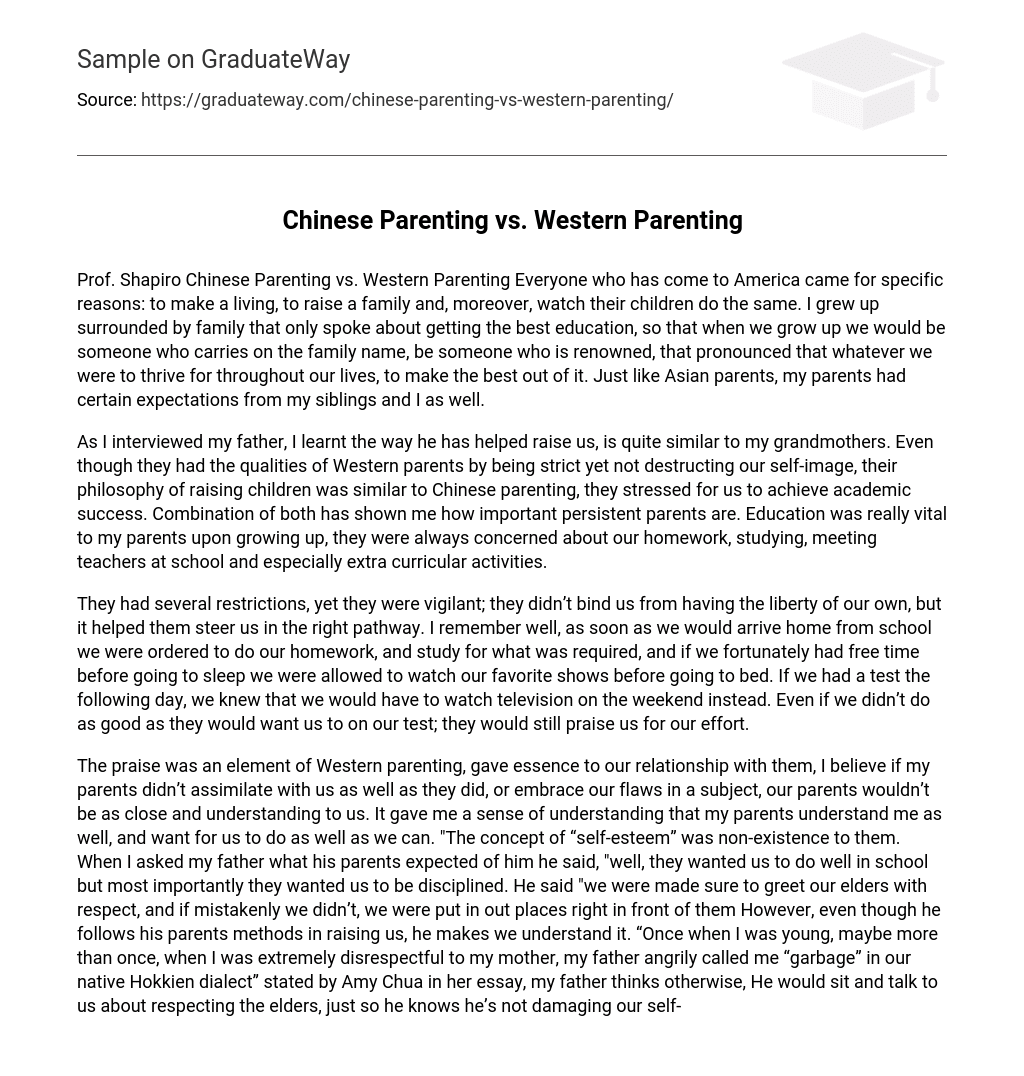All immigrants to America had different motives for coming, such as searching for employment, starting a family, and hoping their children would do the same. Regarding my situation, I was raised in a household that emphasized attaining the finest education achievable. The objective was for us to become accomplished individuals who would uphold our family’s standing and flourish in our chosen endeavors. Comparable to Asian parents, my siblings and I also encountered specific expectations set by our parents.
In my interview with my father, I learned that he raised us in a manner reminiscent of my grandmother. Both embraced Western parenting values such as strictness without harming our self-esteem, while also adhering to Chinese parenting principles that emphasized academic achievement. This fusion has instilled in me the significance of determined parents. Education held great importance for my parents during our upbringing; they consistently prioritized our homework, studying, meetings with teachers, and involvement in extracurricular pursuits.
They had several restrictions, yet they were vigilant; they didn’t limit our freedom, but it guided us in the right direction. The moment we returned from school, we were instructed to complete our homework and study for necessary tasks. If we had any spare time before bed, we were permitted to watch our favorite shows. However, if we had a test the next day, we knew we had to forgo television and save it for the weekend. Even if our test results were not up to their expectations, they would still acknowledge our effort.
The importance of praise in Western parenting cannot be overstated. It is a crucial element in the parent-child relationship, allowing for better understanding and closeness. By accepting and embracing our imperfections in certain areas, our parents showed us that they truly comprehended us and wanted us to succeed. They did not prioritize “self-esteem” as much as they emphasized discipline and academic excellence. According to my father, his parents’ main expectation was for them to excel academically, but above all, they taught them the value of respect for elders. Any failure to display this respect was immediately corrected.
Amy Chua recognizes that her father utilized strong language in their native Hokkien dialect when speaking to her mother. Nonetheless, she underscores that he also seized the chance to educate his children about the importance of honoring elders, making sure it did not negatively impact their self-esteem.
Despite certain limitations, such as not being able to attend sleepovers, our parents made up for it by allowing us to go to birthday parties as we got older. Although I didn’t fully comprehend the reasoning behind this restriction, I believe it was intended to safeguard our well-being. In a religiously diverse country like the United States, maintaining our Islamic faith was of utmost importance to my parents, who view their efforts in this aspect as their greatest accomplishment. From elementary school through high school, we were enrolled in an Islamic school.
From childhood, we acknowledged the importance of religion in our lives. When I started attending Islamic school in second grade, I had doubts about the purpose of wearing a headscarf and long black dress-type clothing as part of our uniform. However, as I got older, my understanding of my religion grew and I understood why my parents chose an Islamic education for me and my sister.
In high school, it seemed like my parents trusted that we understood Islam. It was then that I observed how their values were shaped by Western culture and realized that our understanding would last throughout our lives.
As adults, our parents’ friends frequently inquire about how they successfully raised such well-behaved children. It can be difficult to accomplish in America, but their answer remains consistent: “a little control goes a long way.” We have observed the difficulties they encountered while raising us and believe it is only fair to repay them, even if our endeavors may never fully measure up. Nevertheless, we understand that our actions would be cherished and valued by them.





